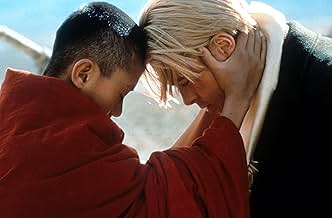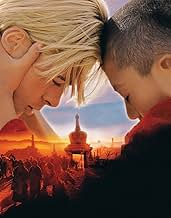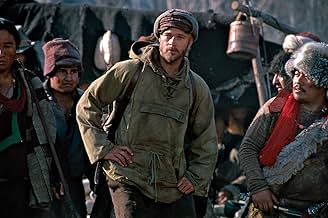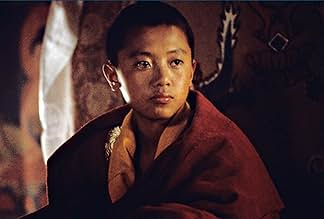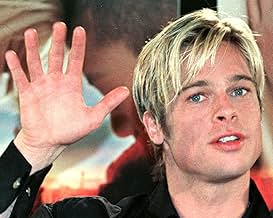La storia vera di Heinrich Harrer, uno scalatore di montagne austriaco che stringe amicizia con il Dalai Lama ai tempi dell'occupazione del Tibet da parte della Cina.La storia vera di Heinrich Harrer, uno scalatore di montagne austriaco che stringe amicizia con il Dalai Lama ai tempi dell'occupazione del Tibet da parte della Cina.La storia vera di Heinrich Harrer, uno scalatore di montagne austriaco che stringe amicizia con il Dalai Lama ai tempi dell'occupazione del Tibet da parte della Cina.
- Premi
- 3 vittorie e 8 candidature totali
BD Wong
- Ngawang Jigme
- (as B.D. Wong)
Ngawang Chojor
- Lord Chamberlain
- (as Ven. Ngawang Chojor)
Recensioni in evidenza
First of all, Seven Years In Tibet is a very aesthetically pleasing film. The snowy Himalayas, the Tibetan villages, and the amazing costumes and religious ceremonies are all filmed beautifully, with rich colours and lighting. The music by John Williams is also excellent, and it's fascinating to hear how it blends with the unusual Tibetan music.
It's not all surface though, there's depth here too. Don't believe the negative comments about Brad Pitt's acting. Admittedly his accent slips a bit in places, but he does a great job as Heinrich, both the unpleasant, arrogant character at the beginning, and the more gentle and wise man that he becomes as the film progresses. His relationship with the young Dalai Lama (a very impressive actor) is an unusual one and refreshingly unsentimental. The film is well edited; scenes are not drawn out any longer than they need to be. As a whole, it is fast paced but also peaceful, tender and moving. You don't get bored but you're not bombarded with pointless action scenes either.
It's a pleasant surprise to see a Hollywood film where women and other cultures aren't treated as objects, and are allowed to be full, complex characters. It could be argued that this film has a Western perspective, but after all, it is adapted from a book written by a European living in Tibet, and intended for Western audiences. It treats the Tibetan culture with a great deal of respect, so I don't really see a problem with that. Similarly, those who have complained that it doesn't tell you enough about the Dalai Lama and too much about Heinrich, ultimately it is Heinrich's story, and that is its strength: that it is one man's tale, and not a political polemic. It gives you a great sense of how people's stories intersect and how the whole world is connected.
Overall, an unusual film, very involving and emotional without sentimentality, with wonderful music and outstanding cinematography. Highly recommended.
It's not all surface though, there's depth here too. Don't believe the negative comments about Brad Pitt's acting. Admittedly his accent slips a bit in places, but he does a great job as Heinrich, both the unpleasant, arrogant character at the beginning, and the more gentle and wise man that he becomes as the film progresses. His relationship with the young Dalai Lama (a very impressive actor) is an unusual one and refreshingly unsentimental. The film is well edited; scenes are not drawn out any longer than they need to be. As a whole, it is fast paced but also peaceful, tender and moving. You don't get bored but you're not bombarded with pointless action scenes either.
It's a pleasant surprise to see a Hollywood film where women and other cultures aren't treated as objects, and are allowed to be full, complex characters. It could be argued that this film has a Western perspective, but after all, it is adapted from a book written by a European living in Tibet, and intended for Western audiences. It treats the Tibetan culture with a great deal of respect, so I don't really see a problem with that. Similarly, those who have complained that it doesn't tell you enough about the Dalai Lama and too much about Heinrich, ultimately it is Heinrich's story, and that is its strength: that it is one man's tale, and not a political polemic. It gives you a great sense of how people's stories intersect and how the whole world is connected.
Overall, an unusual film, very involving and emotional without sentimentality, with wonderful music and outstanding cinematography. Highly recommended.
This is a panoramic film exploring the wilderness of Tibet through the consciousness of an arrogant Austrian climber (Brat Pitt). As Pitt challenges Nanga Parbet, the ninth highest mountain in the world and one of the hardest to climb, the political chaos of late 1930's and 1940's, and his own demons, the nature of mankind is revealed as layers of civilization are peeled to reveal an inner self paradoxically more powerful and yet more vulnerable to the ebb and flow of inhumanity. His own philosophical journey is a reflection of political machinations of the time, the ontogeny recapitulating phylogenetic change of western civilization resulting in a complex modern world forever coiled for violence and warfare.
This film has a European pace unsuitable for those addicted to action figure movies with huge budgets and high body counts. I recommend it as a "good view" similar to a good read.
This film has a European pace unsuitable for those addicted to action figure movies with huge budgets and high body counts. I recommend it as a "good view" similar to a good read.
It's too bad that the movie had to be 139 minutes long. It's not that I can't handle movies that are that long, but when watching longer movies, I expect that it has something to say during that extra time and that's where it sometimes went wrong with "Seven Years in Tibet". It just seemed to keep dragging on forever without contributing to the story.
It needs about 2/3 of the time to show what a bad guy Heinrich Harrer actually is and only 1/3 of the time to show how he changes and gradually becomes a good man. All he thinks about is his career as a mountain climber. In 1939, just before World War II, his wife is pregnant with their first child. Harrer doesn't want to take up his responsibility and 'flees' from her by going to Tibet, where he will try to conquer Mount Nanga Parbat in the Himalayas. Because he is an Austrian and because the Nazi's already have taken over power in Austria, they will use his successes to prove that the Germans are the best race (I hope I don't have to explain the entire Nazi ideology to you, but that you paid enough attention during history class). During his attempt to reach the summit he is arrested by the British and taken to a POW-camp. After several attempts to escape he finally succeeds and together with Peter Aufschnaiter he succeeds to reach Tibet. First he is his old, bad self, but gradually he changes his lifestyle and becomes more 'Tibetan'. He even knows to get the attention of the very young Dalai Lama and becomes friends with him during the period that the Chinese took over power in Tibet.
I don't know if all that is shown in this movie actually happened or to which extent some parts have been made up. Of course it is all a bit politically 'colored' (the Tibetan question is still not solved until today and so there will always be people who will choose China's side and say that what is shown here is completely wrong), but that doesn't mean that this movie doesn't carry a powerful message. But even without this message of being a good husband and not being a career driven jerk, the philosophical Tibetan approach to problems... this movie is very nice eye candy. The landscapes are absolutely stunning and Tibet really looks like a place that certainly is worth a visit. The acting is very good and it all looks very believable.
So despite the fact that this movie dragged on from time to time and that it should have been a bit shorter, this still is a very nice film. I give it a 7/10, perhaps even a 7.5/10.
It needs about 2/3 of the time to show what a bad guy Heinrich Harrer actually is and only 1/3 of the time to show how he changes and gradually becomes a good man. All he thinks about is his career as a mountain climber. In 1939, just before World War II, his wife is pregnant with their first child. Harrer doesn't want to take up his responsibility and 'flees' from her by going to Tibet, where he will try to conquer Mount Nanga Parbat in the Himalayas. Because he is an Austrian and because the Nazi's already have taken over power in Austria, they will use his successes to prove that the Germans are the best race (I hope I don't have to explain the entire Nazi ideology to you, but that you paid enough attention during history class). During his attempt to reach the summit he is arrested by the British and taken to a POW-camp. After several attempts to escape he finally succeeds and together with Peter Aufschnaiter he succeeds to reach Tibet. First he is his old, bad self, but gradually he changes his lifestyle and becomes more 'Tibetan'. He even knows to get the attention of the very young Dalai Lama and becomes friends with him during the period that the Chinese took over power in Tibet.
I don't know if all that is shown in this movie actually happened or to which extent some parts have been made up. Of course it is all a bit politically 'colored' (the Tibetan question is still not solved until today and so there will always be people who will choose China's side and say that what is shown here is completely wrong), but that doesn't mean that this movie doesn't carry a powerful message. But even without this message of being a good husband and not being a career driven jerk, the philosophical Tibetan approach to problems... this movie is very nice eye candy. The landscapes are absolutely stunning and Tibet really looks like a place that certainly is worth a visit. The acting is very good and it all looks very believable.
So despite the fact that this movie dragged on from time to time and that it should have been a bit shorter, this still is a very nice film. I give it a 7/10, perhaps even a 7.5/10.
I missed this film the fist time around and saw it for the first time last night on DVD. I was pleasantly surprised. It seemed to me that some extraordinary effort went into creating an accurate portrayal of the forbidden city of Lhasa, and the lives and culture of the Tibetans who are at the core of the movie.
On the acting side, Brad Pitt was not quite totally believable as a German but, accent-quibbles aside, he did inhabit the character in a way that was compelling and interesting. I thought the supporting cast of Mako and (mostly) Tibetan unknowns was good and the use of these unknowns added credibility to the movie.
The scenery was as beautiful as you would expect it to be -- breathtaking shots of the Himalayas dominating throughout much of the movie.
On the acting side, Brad Pitt was not quite totally believable as a German but, accent-quibbles aside, he did inhabit the character in a way that was compelling and interesting. I thought the supporting cast of Mako and (mostly) Tibetan unknowns was good and the use of these unknowns added credibility to the movie.
The scenery was as beautiful as you would expect it to be -- breathtaking shots of the Himalayas dominating throughout much of the movie.
"Seven Years in Tibet" was a pleasant surprise. Sporting an Austrian accent that got slammed by some critics, I thought Brad Pitt was pretty good as an arrogant Nazi who finds himself captured by the British during a failed expedition to the Himalayas and is later stranded in Tibet after escaping from a POW camp. He finds his humanity in the forbidden-to-foreigners city of Lhasa, especially after meeting the 14 year old Dalai Lama. Echoes of "Lost Horizon," "The King and I" "Last Emperor" and others abound, but the movie is "old Hollywood" in the best sense with magnificent scenery (widescreen advised: the mountains and countryside of Argentina and Canada stand in for Tibet). The heart of the movie is the relationship between the blond Aryan golden boy and the young "Kundun," with a performance by the young Tibetan actor playing the latter that is so charming he nearly steals the whole film. An engrossing blend of fact and fiction, the picture manages to avoid condescending to the Tibetans and over-reverent preachiness. Wrapped in an excellent production, this epic story makes entertaining viewing. One question: how did the young Dalai Lama come by his love of movies in that remote location?
Lo sapevi?
- QuizJetsun Pema is the real-life sister of The Dalai Lama. In this film she plays the mother of The Dalai Lama and hence her own mother.
- BlooperThe movie depicts the Dalai Lama's coronation occurring after Germany surrenders in WWII and after China invades Tibet. The actual enthronement ceremony took place on 22 February 1940, (Iron-Dragon Year, 1st month, 14th day), long before the end of the war and the Chinese invasion. On 17 November 1950, the Dalai Lama assumed full temporal (political) power over Tibet which was more than 10 years after his enthronement ceremony.
- Citazioni
Dalai Lama: We have a saying in Tibet: If a problem can be solved there is no use worrying about it. If it can't be solved, worrying will do no good.
- Curiosità sui creditiAs the end credits roll, a view of the mountains of Tibet is seen.
- Colonne sonorePurification Et Benediction
Performed by Monks of Namgyal Monastere
I più visti
Accedi per valutare e creare un elenco di titoli salvati per ottenere consigli personalizzati
Dettagli
- Data di uscita
- Paese di origine
- Sito ufficiale
- Lingue
- Celebre anche come
- Siete Años en el Tíbet
- Luoghi delle riprese
- Aziende produttrici
- Vedi altri crediti dell’azienda su IMDbPro
Botteghino
- Budget
- 70.000.000 USD (previsto)
- Lordo Stati Uniti e Canada
- 37.957.682 USD
- Fine settimana di apertura Stati Uniti e Canada
- 10.020.378 USD
- 12 ott 1997
- Lordo in tutto il mondo
- 131.457.682 USD
- Tempo di esecuzione2 ore 16 minuti
- Colore
- Mix di suoni
- Proporzioni
- 2.39 : 1
Contribuisci a questa pagina
Suggerisci una modifica o aggiungi i contenuti mancanti

Divario superiore
What is the streaming release date of Sette anni in Tibet (1997) in Canada?
Rispondi


